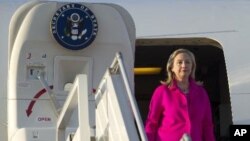U.S. Secretary of State Hillary Clinton has completed a three-day visit to Burma after discussions with democracy leader Aung San Suu Kyi and a vow that the United States is prepared to support further democratic reform.
"We are prepared to go further if the reforms maintain momentum, but history teaches us to be cautious," said Clinton. "We know that there have been serious setbacks and grave disappointments over the last decades."
The two women held hands as they spoke to reporters Friday from the veranda of Aung San Suu Kyi's home in Rangoon, where the democracy leader was held under house arrest for most of the past two decades. Clinton said the U.S. will contribute about $1.2 million in aid to Burma for landmine victims, microfinance operations, and health care initiatives.
But she said tough sanctions on Burma will not be lifted until Burma makes concrete steps toward democracy.
"We will match action for action. And if there is enough progress, obviously we will be considering lifting sanction," she said.
Clinton praised Aung San Suu Kyi's "steadfast and clear" leadership, saying that the U.S. wants to see Burma take its rightful place in the world. She called the democracy leader an inspiration.
Aung San Suu Kyi said she was happy with the way in which the U.S. is engaging with Burma and thought it would make the process of democratization easier.
During a Thursday visit to Burma's capital, Naypyidaw, Clinton said any step Burma takes toward political reform will be carefully considered.
She urged the government to speed up reconciliation efforts by releasing more political prisoners and stopping violent campaigns against ethnic minorities. Clinton also urged Burma to end any "illicit" military ties to North Korea and respect international consensus against the spread of nuclear weapons.
She spoke to reporters after a historic meeting with Burmese President Thein Sein who has overseen tentative steps to reform since he took over in March. The former military officer hailed what he called a new chapter in U.S.-Burmese relations.
The new Burmese government has released about 200 political prisoners, eased some press restrictions and opened a dialogue with some of its critics, including Aung San Suu Kyi.
The Nobel peace prize laureate was freed from house arrest last year after spending much of the previous 20 years in detention. Her party won a national election in 1990 by a landslide, but was stopped from taking power. She confirmed Wednesday that she will run for parliament in upcoming elections.
The U.S. and other Western nations imposed sanctions on the former Burmese military government because of its harsh human rights abuses, including military operations against ethnic groups and the jailing of up to 2,000 political prisoners. Clinton repeated the call for the release of those political prisoners.
She is the first U.S. secretary of state to visit Burma in 50 years.
Some information for this report was provided by AP.




